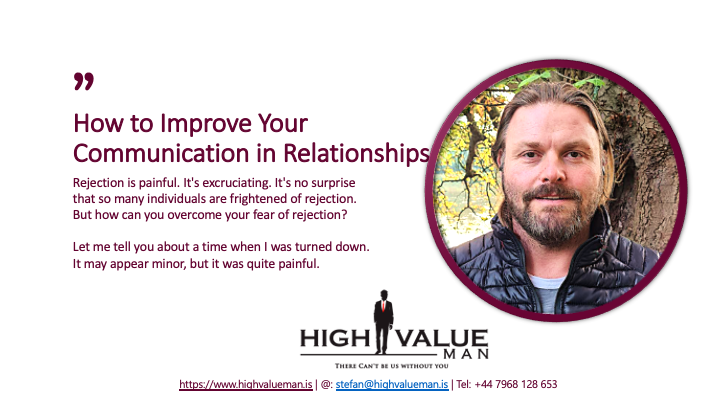While every relationship is unique and has its own set of ups and downs, being able to communicate with your spouse allows you to discuss your concerns, show support for one another, and work together to resolve conflicts more successfully.
Learn why communication is so vital in relationships in this article. Explore some of the features of successful communication, learn to recognise warning signals of possible difficulties, and discover how to enhance your communication abilities.
The Advantages of Communication in Relationships
According to clinical psychologists, a couple's communication pattern may often foretell how successful a relationship will be. Good communication may assist your relationship in a variety of ways, including:
It can reduce rumination: Instead of stewing over unpleasant emotions, excellent communication helps individuals discuss and resolve their issues more positively and positively.
It promotes intimacy: Developing a deep emotional connection with another person necessitates a reciprocal give-and-take in terms of revealing personal information and listening to the other person. Discussing your experiences, views, values, opinions, and expectations is part of this reciprocal self-disclosure. To do so, you must both have communication skills that promote this relationship and allow it to grow and deepen over time.
It lessens and resolves conflict: Every relationship will suffer conflict at some point. However, when you can talk about your concerns openly and honestly, you may more easily overcome fights and disagreements. Rather than becoming trapped in a loop of misunderstandings, wounded emotions, and emotional struggle, you may confront your issues and work to improve your relationship.
Communication Isn't a Cure-All
While it has long been assumed that if you want to enhance your relationship, you should start by increasing your communication, a new study suggests that this may not be the case.
According to research published in the Journal of Marriage and Family, while there is a link between communication and relationship satisfaction, strong communication alone does not predict how happy you will be in your relationships.
Other elements, such as how much interaction a couple has, each partner's personality traits, and stress, all play a role in determining how pleased people are in their relationship.
While research reveals that effective communication skills aren't a guarantee for a successful relationship, there is plenty of evidence that good communication skills improve relationships and well-being in various ways.
One method to establish a robust and supportive connection with your spouse is through effective communication. When you actively listen and respond to your spouse (and they reciprocate), you are more likely to feel appreciated and cared for.
One research discovered that people who believe their spouse appreciates them are more likely to sleep well. Ultimately, feeling more respected, optimistic, and joyful in your relationships can improve your entire well-being.
Recap
Communication is only one aspect of a healthy relationship. According to research, people who are satisfied in their relationships are more likely to communicate well with one another.
Effective Communication Characteristics
So, what exactly do experts mean when they say "excellent communication"? Are you and your spouse on the same page, or are there signals that there may be an issue in your relationship?
To begin, we must define what we mean by communication. On the surface, it is about the words that people use to communicate with one another. However, it can also include nonverbal communication such as tone of voice, body language, and other types of nonverbal communication. In many circumstances, what you don't say is equally as important as, if not more important than, what you do say.
Some characteristics of effective relationship communication include:
Active listening: entails being engaged in the conversation, listening intently, and thinking about what others have said. It also entails seeking clarification when necessary and refraining from passing judgement.
Personalising issues: People skilled at communicating in relationships avoid personalising their partner's behaviour. Instead, they concentrate on the problem and how to address it.
Making use of "I" statements: In interpersonal situations, I-statements can be helpful. Rather than stating, "You never clean up after yourself," use an I-statement such as, "I feel uncomfortable when there is clutter gathering about the house."
Kindness: is essential because it helps individuals feel valued and understood.
Being in the moment: It is critical to be totally present at the moment when conversing with your companion. Distractions from outside sources, mainly technology distractions like your phone, might result in a lack of communication and a bad connection.
Acceptance: Accepting and affirming the other person, even if you disagree with them, is part of healthy communication. When you communicate well with your spouse, you know that individuals have the right to feel their emotions and reactions, even if they differ from yours.
Recap
Instead of attempting to win an argument, good relationship communication requires attentively listening, avoiding judgements, and exercising compassion.
Symptoms of Communication Issues
Some symptoms that your relationship is suffering from communication issues include:
- Assuming you know what your spouse is thinking or feeling
- Constantly criticising one another Passive-aggressive behaviour
- Feeling as if you can't fully communicate with your partner
- When your spouse attempts to talk to you, you get defensive.
- Using the silent treatment on each other
- Repeating the same arguments without reaching a conclusion
- Refusing to compromise or listen to the other person's perspective
- Avoiding difficulties or dialogues via stonewalling
It is also critical to learn to identify some of the more subtle indications of poor communication. This might involve avoiding fights in order to preserve the peace. If you never disagree, it suggests that one of you is concealing your true feelings or thoughts in order to prevent a quarrel. This deprives you both of the opportunity to participate in true, open, and honest talks.
Another typical communication difficulty in partnerships is withholding. Instead of having difficult talks with your partner, you may ignore the subject and vent your frustration, aggravation, worry, or troubles on the people in your life.
For example, if you do not express your displeasure to your partner, you may vent to a friend. While this may offer you an emotional release, it does nothing to address the issue. It may also result in passive-aggressive behaviour to "punish" your spouse for not being able to read your mind.
Recap
Criticism, defensiveness, silence, and a sense of being misunderstood indicate communication issues in a relationship. And not debating isn't always an indication that you're speaking effectively. Instead, it might suggest that you withhold information to prevent disagreement.
Improve Your Communication Skills
If you believe that your relationship is suffering due to inadequate communication, there are ways to help you enhance your connection.
Think About Your Attachment Style
Consider how your attachment style may influence your communication practises. Attachment styles are the patterns of conduct you exhibit in relationships. Your early attachment style, which arises in childhood due to caregiver interactions, might continue to influence how you behave and respond in adult love relationships.
If you have an insecure attachment style, you are more prone to engage in nervous or avoidant communication habits. Recognising how your attachment style influences how you connect with your relationship (and how your spouse's style influences how they engage with you) might indicate what you may need to work on.
Recap
If you or your spouse has an insecure attachment style, it might affect how you communicate and engage with one other. Knowing your communication style and how it may show as worried or avoidant behaviour might help you overcome less effective communication practices.
Be completely present.
Reduce distractions and focus on being totally present when talking to ensure that both of you are listening and comprehending. This might include making time each day to truly focus on each other and chat about the events of the day and any issues you may have.
Limiting your gadget use at particular times of day, such as during meals or before going to bed, can help you focus on your spouse without being distracted.
Make use of "I" statements.
Communication issues can often be exacerbated by how you talk to each other. Arguments may rapidly devolve into discussions about who is "correct" or who gets the final word if you both focus on disputing facts without discussing feelings.
"I" comments focus on your feelings rather than your partner's conduct. Instead of stating, "You are never on time," you may respond, "I feel scared when you are late."
Using this sort of remark can make talks appear less accusatory or accusing, allowing you and your spouse to focus on the emotions at the root of some of your concerns.
Avoid Unfavourable Communication Patterns
Consider how your actions affect your relationship when you are inclined to ignore your spouse, indulge in passive-aggressive conduct, or shout. It's not always simple to break these habits, especially because many of them were created in infancy, but becoming more conscious of them can help you begin to replace these detrimental habits with healthier, more positive ones.
Concentrate on Your Relationship
While effective communication is essential, research indicates that it is only one of several aspects that influence the success, longevity, and pleasure of partnerships.
Indeed, research suggests that your relationship happiness may influence how effectively you and your spouse communicate. People are more willing to openly discuss their ideas, feelings, issues, and difficulties with one another if they are content in their relationship.
Recap
If you want to enhance your communication, concentrating on improving your whole connection might help.
Summary
In a relationship, effective communication helps people tell others what they need and respond to their partner's needs. It gives people the feeling of being understood, affirmed, and linked to another person.
Remember that the purpose of communication is to comprehend one another. It's not about putting things under the rug to avoid any conflict. Instead, concentrate on understanding by listening and reacting with empathy and care. If you and your spouse have communication problems, seek help and coping strategies.


